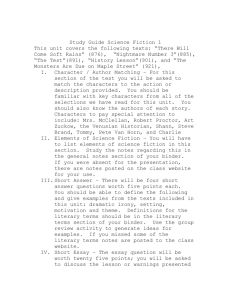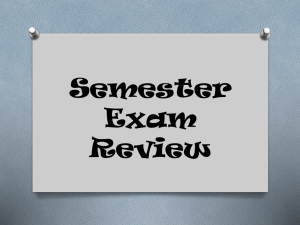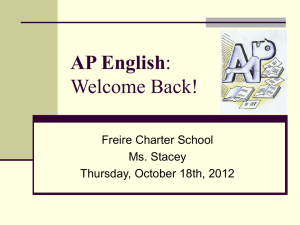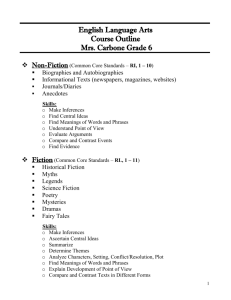If you are completing your degree under the pre-2014-15 major... ENGL 330, ENGL 372, ENGL
advertisement
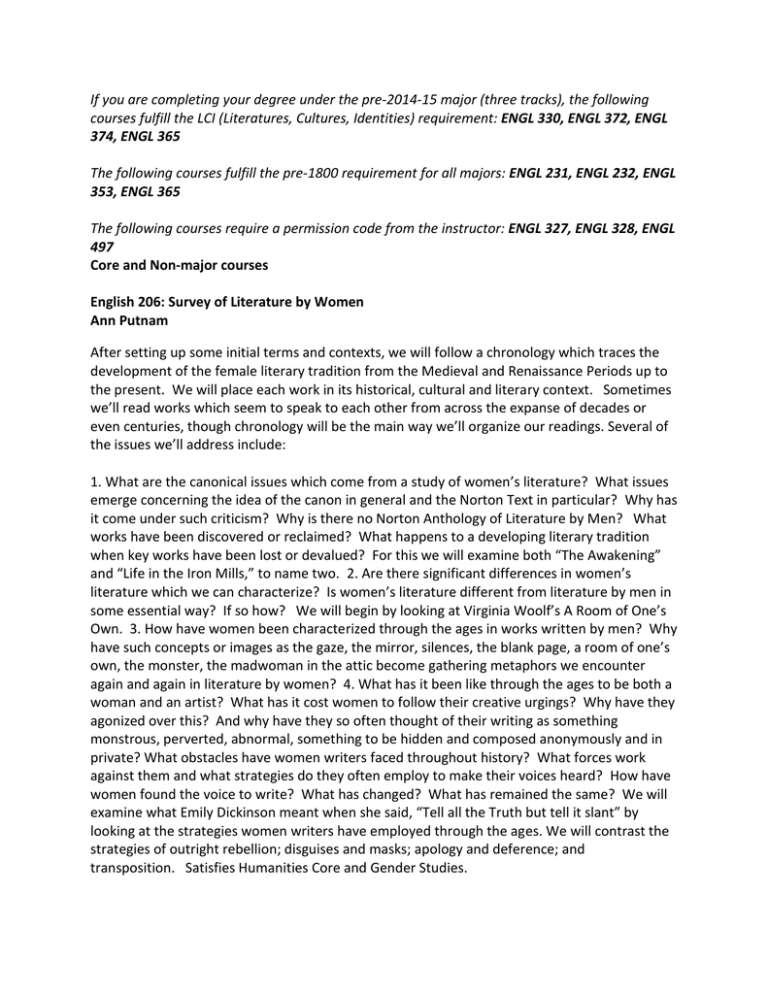
If you are completing your degree under the pre-2014-15 major (three tracks), the following courses fulfill the LCI (Literatures, Cultures, Identities) requirement: ENGL 330, ENGL 372, ENGL 374, ENGL 365 The following courses fulfill the pre-1800 requirement for all majors: ENGL 231, ENGL 232, ENGL 353, ENGL 365 The following courses require a permission code from the instructor: ENGL 327, ENGL 328, ENGL 497 Core and Non-major courses English 206: Survey of Literature by Women Ann Putnam After setting up some initial terms and contexts, we will follow a chronology which traces the development of the female literary tradition from the Medieval and Renaissance Periods up to the present. We will place each work in its historical, cultural and literary context. Sometimes we’ll read works which seem to speak to each other from across the expanse of decades or even centuries, though chronology will be the main way we’ll organize our readings. Several of the issues we’ll address include: 1. What are the canonical issues which come from a study of women’s literature? What issues emerge concerning the idea of the canon in general and the Norton Text in particular? Why has it come under such criticism? Why is there no Norton Anthology of Literature by Men? What works have been discovered or reclaimed? What happens to a developing literary tradition when key works have been lost or devalued? For this we will examine both “The Awakening” and “Life in the Iron Mills,” to name two. 2. Are there significant differences in women’s literature which we can characterize? Is women’s literature different from literature by men in some essential way? If so how? We will begin by looking at Virginia Woolf’s A Room of One’s Own. 3. How have women been characterized through the ages in works written by men? Why have such concepts or images as the gaze, the mirror, silences, the blank page, a room of one’s own, the monster, the madwoman in the attic become gathering metaphors we encounter again and again in literature by women? 4. What has it been like through the ages to be both a woman and an artist? What has it cost women to follow their creative urgings? Why have they agonized over this? And why have they so often thought of their writing as something monstrous, perverted, abnormal, something to be hidden and composed anonymously and in private? What obstacles have women writers faced throughout history? What forces work against them and what strategies do they often employ to make their voices heard? How have women found the voice to write? What has changed? What has remained the same? We will examine what Emily Dickinson meant when she said, “Tell all the Truth but tell it slant” by looking at the strategies women writers have employed through the ages. We will contrast the strategies of outright rebellion; disguises and masks; apology and deference; and transposition. Satisfies Humanities Core and Gender Studies. English 212: The Craft of Literature: Magic Realism Suzanne Warren According to critic Ilan Stavans, magic realist literature approaches strange, atypical, even fabulous events as if they were a normal part of life. While the genre resists the basic assumptions of post-Enlightenment rationalism and literary realism, it differs from pure fantasy because it is set in a seemingly ordinary world described realistically. In this class, we look at texts from Europe and the Americas that offer fantastic visions of the real world. This literature takes up the genre as a way of exploring history, culture, politics, psychology, metaphysics, and philosophy. These texts suggest diverse ways of making sense of the real, explaining the inexplicable, and managing the unmanageable. In so doing, they unmask the fantastic absurdities of the world at hand. Course authors may include Kafka, Borges, Atwood, Mellas, and Díaz. English 213: Autobiography/Biography: Writings from the River: The Self as Hero Beverly Conner This course will examine the genre critically and creatively, thinking how the self both creates and is created by the text. We will explore connections and differences among autobiography, biography, literary memoir, and personal essay. We will consider how and experience why writing about the self so often entails an act of courage. In this last regard, we will give thoughtful attention to a diverse genre that spans cultures, genders, classes, and ages. And in exploring the myth of objectivity, we will also reflect on how imagination may play a part in telling the greater truths. We will read On Writing by Stephen King, Full Moon at Noontide, A Daughter’s Last Goodbye by Professor Ann Putnam, The Glass Castle by Jeannette Walls, andThis Boy’s Life by Tobias Wolff, among several other books. Courses for the Major: English 220: Introduction to English Studies Priti Joshi Our entry into the world college-level English Studies will occur through the thematic of "revision" or "rewriting.” Focusing on a wide range of poetry (lyric, dramatic monologue, sonnet, etc.), prose (short stories, novels, historical documents), drama (a Shakespeare play), and a graphic memoir, we will consider the ways writers and texts reexamine and reformulate issues – formal, as well as thematic - from multiple perspectives. Throughout we will pay close attention to the craft and analysis of literary and cultural texts, always considering the relation between formal choices and thematic content. Student writing will consist of analytic papers, creative texts, and an essay engaging cultural issues. English 220: Introduction to English Studies Darcy Irvin English 220 is a gateway course designed to prepare you for the English survey and upper division special topics classes. Rather than focus on literature from a specific period or genre, we'll instead read a wide variety of texts in order to help us understand literature as a field of study. What constitutes a work of literature and what does literature do? Who decides which texts are "literary"? And what kinds of reading practices do we employ in order to study literary texts? Although we will close read these texts through discussion and formal argumentative essays, we'll also approach these literary works through creative assignments. For spring 2016, our major texts will be Station Eleven by Emily St. John Mandel, Fun Homeby Alison Bechdel, and Twelfth Night by William Shakespeare. We'll also read poetry and short stories by a wide range of authors, including Italo Calvino, Margaret Atwood, Octavia Butler, Emily Dickinson, and Haruki Murakami. English 227: Introduction to Fiction Writing Laura Krughoff In this course, students will be introduced to the fundamental techniques of fiction writing. We will read, discuss, and analyze the work of master short story writers as an introduction to essential matters of craft. These readings will be used to model various literary styles and techniques, and the first half of the semester will be spent developing and honing these skills. In the second half of the semester, students will write two short stories and revise one of those stories at the end of the semester. Students will participate in observation-based workshops of their peers’ fiction, a workshop strategy we will discuss in detail in class. There will also be regular quizzes, short writing assignments, and a mid-term exam. English 227: Introduction to Fiction Writing Ann Putnam In this course you will write two 5-6 page stories, one Short Short and one Deep Revision, in addition to keeping a writer’s log and reading lots of short stories. You will have many opportunities to participate in panels, small group workshops, large group workshops, as well as many in-class writing sessions. Each day when you come to class you will know exactly what to expect, but you will also be surprised. So you'll need to be here every day--ready to do things you've never done before, remember things you've never remembered before, ready to write about things you didn't know you knew. All you need is a brave and willing heart. English 228: Introduction to Writing: Poetry Beverly Conner Through writing your own poetry and through reading a variety of poets, you will explore the genre not only as an expressive art but also as a new way of seeing: a sharper condensation of yourself and of your world. “Let us remember . . . that in the end we go to poetry for one reason, so that we might more fully inhabit our lives and the world in which we live them, and that if we more fully inhabit these things, we might be less apt to destroy both.” --Christian Wiman, Editor of Poetry Magazine. In this class we are attempting literary art—hoping to find meaning for ourselves and to convey it to others. You will learn about meter, rhyme, imagery, free verse, and other forms and elements of poetry. Even if you do not intend to continue writing poems, you will come to a greater enjoyment of reading poetry and other imaginative work (novels, short stories, plays, etc.). You will also find that all of your writing (yes, even research papers) will be enhanced by your close attention in this class to language. English 231: British Literature and Culture: Medieval to Renaissance John Wesley If you’re interested in learning about angels and devils, dragons and fart jokes, then this is the course for you. We’ll study the first literary texts written in the English language, carrying us from the haunted mead-halls of Beowulf, to the boozy tavern of The Canterbury Tales, and to the heaven and hell of Paradise Lost. That’s about a thousand years of coverage, but rather than march through the centuries reading everything in its path, this course is organized around three units, each with its own focus. In the first unit, “Heroes and Monsters,” we study epic and Arthurian literature; in the second, “Voice and Incarnation,” we read dramatic literature, including medieval mystery plays, Doctor Faustus, and King Lear; and in the third and final unit, “Inner Lives,” we turn to questions of subjectivity in both narrative and lyric poetry. Thus, we will read the entire period three times, but each time with a different thematic lens. My hope is that we will be fascinated not only by what will seem like strange aesthetic and cultural contexts far removed from our own, but also by the many desires, anxieties, and conflicts we share with this period, and which continue to shape both our imaginations and the stories we tell. English 232: British Literature and Culture: Restoration to Reformation Nese Devenot This course examines the long eighteenth century (circa 1690-1830) through the lens of its visualization technologies. Beginning with the popularization of the microscope and telescope, we will trace the impact of new ways of seeing on the literary imagination. With the revelation of active worlds teeming below the normal threshold of human perception, experimental science rejuvenated ancient theories about a “Great Chain” or hierarchy of beings large and small. This attention finds poetic corollaries in intensely focused observations of the world and in imaginative projections into the lives of insects and animals. But while the microscope opened new vistas to exploration, it also encouraged nightmarish fantasies about living with acutely enhanced sensation. Rather than mourning the limitations of our senses, many argued, we should rejoice at our obliviousness to overwhelming details. Thus Alexander Pope would famously proclaim: “Why has not man a microscopic eye? For this plain reason, man is not a fly.” In addition to the relativizing of mankind’s stature in the cosmos caused by the multiplication of worlds, we will also explore the developing role of the English “spectator” as established through the circulation of periodicals, and the role of elaborate theatrical “spectacles” involving sophisticated machinery and special effects in popular entertainment. In considering how eighteenth-century writers grappled with revelations of mediated vision, we will learn to attend closely to the written word across genres. English 236: Modern U.S. Literature (1917-Contemporary) Mike Benveniste This course outlines the literary production of the United States from (roughly) WWI to the present. Much of what has shaped the course of modern American Literature has been an ongoing debate, implicitly and explicitly, over what “American Literature” is, who would be included in such a canon, and, whether or not such a grouping is meaningful at all. Rather than attempting to confine the literature of this period to a single historical narrative, this course will to attend to the myriad ways that writers have adapted inherited notions of literature and aesthetics as a part of their response to their political and historical moment. Consequently, we will strive to cultivate a dialectical understanding of texts as simultaneously historical artifacts and creative projects. So doing, we will explore a diverse group of writers who have claimed their place within the literature of the U.S. over the last hundred-plus years, endeavoring to understand their work as a mediated response to the exigencies of their socio-cultural context. What this means is that this class will not be about ‘the Story of American Literature’; no such unifying story exists. Nor will this class be about learning about US history through literature. Instead, this class will be about literary history in context, and, therefore the goal is not so much a single narrative of history or literature, but a way of thinking about the relationship between literature and history. As we explore this changing relationship, we will see that literary history is ultimately located in the way writers receive and innovate upon aesthetic forms (like Modernism, Postmodernism, etc…) as they respond to or engage the pressing issues of their day. English 327: Advanced Fiction Writing Laura Krughoff In this advanced fiction workshop, we will consider what it means for a writer to develop a body of work. While we will continue to practice and hone the fundamental skills and techniques used in narrative prose, the expectation in this course will be that you are ready to produce complete works of short fiction and are beginning to explore your own voice, aesthetic, subjects, and themes as a writer. To this end, our work will be two-fold: we will read selections from seven collections of short fiction to examine how important contemporary American short story writers pursue particular themes, return to and re-examine various topics, and develop a recognizable style or aesthetic. You will simultaneously produce a total of five works of original fiction, and the semester will culminate in a portfolio that curates your best work augmented by an artist’s statement that illuminates why you have chosen the stories you have and what the portfolio reveals about your own body of work. This course is, obviously, reading and writing intensive. A great deal is going to be asked of you. It is my hope that by dint of the hard work you will put in over this semester, each one of you will grow as a reader and a writer, as a thinker and a critic, and, most importantly, as an artist with a vision. Note: Permission codes MUST be obtained from the instructor. Please contact Prof. Krughoff at lkrughoff@pugetsound.edu. English 328: Advanced Poetry Writing: The Collection Michael Haeflinger This course will focus on how we think about gathering our poems into collections. In addition to generating new works, we will focus heavily on revising work and organizing it into a manuscript. By the end of the semester, students will have a chapbook-length manuscript, as well as an understanding of how professional poets organize their books. Additionally, we will look at longer poems and book-length poems. Readings will include Williams Carlos Williams, Rita Dove, Claudia Rankine, Russell Edson, and others. Note: Permission codes MUST be obtained from the instructor. Please contact Prof. Haeflinger atmhaeflinger@pugetsound.edu. English 330: Irrealism: Problems of Reference, Reality and Relevance in Late-20th C.-toContemporary Multiethnic US Fiction Mike Benveniste In his 1978 book, Ways of Worldmaking, philosopher Nelson Goodman outlined his theory of irrealism, asserting that the question of realism is moot because we inhabit worlds of our own making, such that there is no Reality, just plural versions thereof. By most accounts, US culture, and hence literature, underwent a massive paradigm shift that challenged the very notion of reality in the years after WWII. In this period, literary fiction explicitly defined itself against aesthetic realism, as late-Modernism and Postmodernism emerged as modes of prestige literature. At the same time, intellectual and historical factors like the Cold war, the Civil Rights Movement, identity politics, post-industrialism, Poststructural and cultural theory, and the ‘end of ideology’ dispelled belief in objectivity and suggested that realism was a dangerous fantasy. How then, might literature be relevant after realism? If literature does not represent reality, what does it do? What is the relationship between the real, the unreal, and the fictive? Because this period is paradoxically marked both by Postmodernism’s rejection of realism and ethnic literature’s reinvestment in the socio-political, we will study a multi-ethnic canon of writers from 1945 to the present in order to think about literature as a tactical response to social conflict. How and why might recent US fiction that self-consciously eschews verisimilitude – the appearance of faithfully re-presenting reality – address social and historical problems? What does irrealism make possible? What is the function of fiction? And, as fiction, what is its sociopolitical value? We will contextualize our discussions with readings from narrative theory, unnatural narratology, philosophy, and theory of fiction, as we examine the use of irrealism by diverse writers such as Colson Whitehead, George Saunders, Chang Rae Lee, Sesshu Foster, Ishmael Reed, Charles Yu, Aimee bender, Karen Tei Yamashita and Jeff VanderMeer. NOTE: This course will involve a heavy reading load, sometimes averaging as many as 400 pages per week. Included in this will be a number of primary texts in philosophy and theory. English 340: Film Genres: Documentary Mita Mahato This course explores some of the major theoretical and cinematic approaches to the documentary genre of film, and instructs students in the production of a short (20-30 minute) film project of their own based upon this exploration. Throughout the semester, in order to develop a critical eye for the cinematic and ethical choices involved in the genre, students will study the work of pioneering documentary filmmakers (Thomas Edison, Robert Flaherty, Sergei Eisenstein), as well as contemporary directors who have experimented with and extended the genre (Errol Morris, Werner Herzog, Susan Stryker, etc.). Through the analysis and simultaneous production of documentary, students will interrogate the ways that industrial, social, technological, and aesthetic factors shape the development, circulation, and reception of the film document over time. In addition to regular class time, evening film screenings are required. Prior coursework in film studies and comfort with the language of film related to visuals, editing, and sound is required for students interested in enrolling in this course; please see Professor Mahato if you have questions about your eligibility. English 353: The Bible and the Literary Tradition John Wesley In this year’s offering of 353, we will focus our attention on the stories in Genesis, Exodus, the Gospels, and Revelation, and examine the myriad ways in which they have been used and interpreted—not always consciously—by writers of English literature. We will also use assigned theoretical readings to help us think critically about how we study the influence of the Bible, and even how we may study the Bible itself as literature. Along the way, we will read variously and widely in terms of genre and period—from Renaissance sonnet to postmodern novel—and at the same time consider the individual and cultural contexts that motivate these retellings. English 365: Medieval Women Writers Denise Despres Silence was a medieval woman’s greatest virtue, making the idea of female authorship synonymous with immodesty or, worse, the creation of fiction—and the fabulous was a kind of lie or deceit spun out of the unreliable and fallen human imagination. A host of cultural assumptions made the term “medieval woman writer” dangerous, even potentially heretical; the highly nuanced strategies medieval women employed to legitimize their authority to speak, as well as to offer their readers recognizable genres, discourses, and imagery worthy of attention is the subject of this course. Just as students who take courses on African-American literature or the Indian novel must approach these tradition with an informed cultural sensitivity, so we will need to reconstruct the world in which these women expressed themselves to find their texts accessible. Each writer we encounter will require us to refine our ideas about the conditions for women writers in the Middle Ages. Among other issues, we will explore the difference between constructions of gender and sexuality; the dissemination of women’s writings in “textual communities”; the link between sexual status (virgins, widows and wives) and female authority; the classification of women in medieval “estates” and on the margins of society. Although the method of the course is close, comparative reading and discussion, we will supplement primary readings by scholarship by literary, cultural and religious historians. Authors include Marie de France, Marguerite Porete, Julian of Norwich, and Christine de Pizan. Crosslisted with GQS. English 372: History of Rhetorical Theory Julie Christoph This course examines major concepts and theorists within the rhetorical tradition, beginning with antiquity and ending with the present. Issues central to the course include how culture and rhetorical theory mutually inform each other, whether truth pre-exists discourse, whether rhetoric is ethical, whether the goal of rhetoric is necessarily persuasion, and whether the mode of presentation in speech or writing alters the meaning of rhetoric. Throughout the course we will be paying focused attention to questions about power and access to public discourse: Who gets to speak, to whom, and under what circumstances? As a class, we will use theory to examine the rhetoric of our everyday lives and will explore the implications of rhetorical theory for modern America—particularly through examining the intersections between rhetorical theory and writing instruction, political and social activism, and visual media. This course fulfills the KNOW graduation requirement, as well as the pre-1800 and English Literatures, Cultures, & Identities requirements. English 374: Literature and the Environment Darcy Irvin What exactly is a natural space? What do we mean when we call a place "wild" or "unspoiled"? Is there room for humans in nature or does nature exist where we do not? For this advanced course on Literature and the Environment, we'll tackle these important questions by considering how nature and the environment have been represented in literary works. How does our tendency to aestheticize nature affect our understanding of the world and our role in it? What does it mean to "read" a landscape or attempt to reproduce a physical space using language? In order to help us answer some of these questions, we'll rely on theoretical frameworks to help us understand concepts like the Anthropocene and the role of gender, race, and class in literary representations of the natural world. Although I will plan out much of the course, enrolled students will have the option of helping develop a portion of the syllabus and deciding on assigned texts. Authors for this class may include Paolo Bacigalupi, Octavia Butler, Margaret Atwood, Henry David Thoreau, Lü Jiamin, Marc Reisner, and Edward Abbey. The capstone text for the course will likely be the film Snowpiercer. English 381: William Blake and His Worlds George Erving This course studies the works of William Blake (1757-1827)—poet, prophet, painter, engraver, political radical, religious nonconformist, and canonical exemplar of British Romanticism. Our readings immerse us in Blake’s worlds: those of a severely divided British nation at war with itself and with France over the political ideals advanced by the French Revolution, the mysterious subculture of London artisans, political radicals, and eccentric religious cults, and the visionary worlds of his illustrated poetry where imaginative energy does battle with the forces of spiritual oppression. English 433: Illness and Narrative: Discourses of Disease Mita Mahato Can narrative express an experience that is by nature inexpressible? Drawing off of the growing field of Medical Humanities, this senior experience seminar is as much about illness (its politics, histories, and personalities) as it is about language and representation. In the opening weeks of the seminar, students will encounter a number of written and visual texts that will attest to the diverse ways in which illness has influenced our modes of communication and, in turn, how these modes have influenced how we think about illness. Though the subject matter of these discussions will be broad (ranging from plague in enlightenment London to modern diseases like Ebola and AIDS), they will be guided by critical scholarship in the medical humanities, semiotics, and narratology and grounded by questions about discourse and narration, including: What influence does illness (epidemic or personal) have on narrative? What is the relationship between social and political attitudes toward disease and the way texts characterize healthy and sick? What are the recuperative or reformative functions of narrative? As students turn to individual case studies toward the middle of the term, they will be guided in the development of research skills. These individual studies will become the basis both for continued classroom conversation, as well as a final research project. English 497: The Writing Internship Tiffany MacBain ENGL497, the internship seminar, supports students as they negotiate the transition from classroom to workplace. Students consider how the skills they have developed as English majors translate to the field—whatever that field may be—and identify and utilize opportunities for mentoring and professional skill building that good internships deliver. Course readings and discussions guide students to develop critical and practical perspectives about the work they produce and the workplace culture they encounter, and writing workshops hone students' technical and professional writing. The course includes a strong reflective component to encourage students to consider their personal and professional development and to explore career goals. ENGL497 is open to students of advanced standing, and the process of enrollment is different than for any other course. Students intending to enroll in the course should meet with Prof. MacBain this semester to discuss their areas of interest and to formulate their plan for obtaining an internship. After we have met, but before the start of spring term, students must secure a writing-oriented internship. The internship must afford you 120 hours of work during the semester, which translates to 8-10 hours per week. Prof. MacBain will provide add codes to students who have obtained an internship and completed a learning agreement, complete with employer’s signature (http://www.pugetsound.edu/about/officesservices/ces/students/building-experience/internships/learning-agreements/). Note: Because of the time needed to arrange an internship, students can expect to receive the add code later than they would for another course—immediately prior to the start of spring semester or even as late as week one of the term. Non-English courses of interest: Humanities 302: Knights, Mystics, and Pilgrims Denise Despres Students often view the Middle Ages (the period that traditional historians locate between late Classical Antiquity and the Renaissance, roughly the 5th to the 15th centuries) as primitive and static. To the contrary, the Middle Ages was a period of cross-cultural contact, and religious and cultural syncretism, witnessing the spread of Buddhism, Christianity, and Islam through the travel of missionaries, pilgrims, and mounted warriors. Merchants and monks, pilgrims seeking illumination through contact with holy relics and shrines, feudal lords and ordinary folk performed religious rites or sought adventure, figuring in medieval stories in all three traditions. Connections 302 introduces students to one thread of this global narrative: the medieval stories, material artifacts, and historical sources in the Western Christian tradition that invites us to explore the roots of our contemporary fascination with the Arthurian knight’s quest, pilgrimage, and the interior journey of the mystic. These archetypal journeys will undoubtedly seem somewhat familiar to you. Most students have a rudimentary knowledge of the cult of chivalry, medieval quest narratives, courtly love, feudalism, and religious or chivalric icons, whether saints such as Joan of Arc, or knights like Percival and Sir Lancelot. These institutions, storybook characters and historical personages, visual and literary conventions, still influence us through retellings of the Arthurian romances, new fantasy fiction (from Harry Potter to the Da Vinci Code), the gaming and film industry. It is my hope that those of you who are intrigued by our course material will feel equipped to read about knights, pilgrims, and mystics in other cultural traditions or, if you have already, see points of connection between them. Authors include Malory, Chaucer, Dante.
